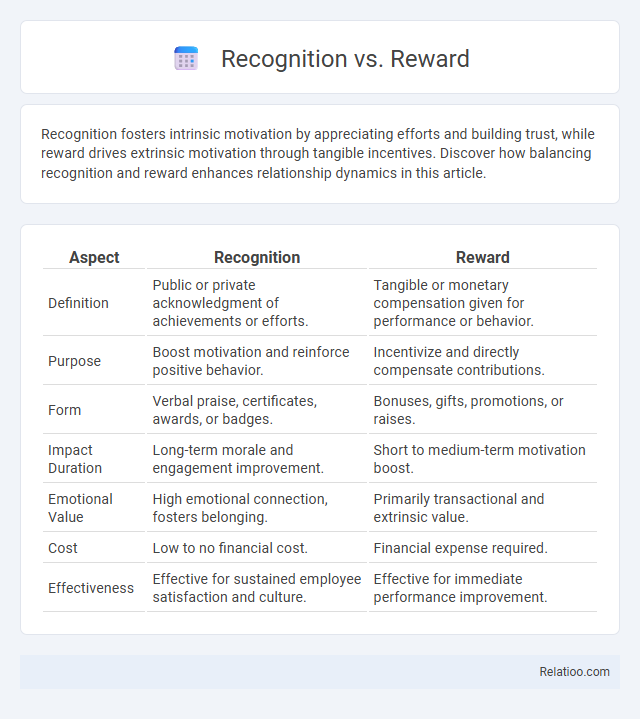Recognition fosters intrinsic motivation by appreciating efforts and building trust, while reward drives extrinsic motivation through tangible incentives. Discover how balancing recognition and reward enhances relationship dynamics in this article.
Table of Comparison
| Aspect | Recognition | Reward |
|---|---|---|
| Definition | Public or private acknowledgment of achievements or efforts. | Tangible or monetary compensation given for performance or behavior. |
| Purpose | Boost motivation and reinforce positive behavior. | Incentivize and directly compensate contributions. |
| Form | Verbal praise, certificates, awards, or badges. | Bonuses, gifts, promotions, or raises. |
| Impact Duration | Long-term morale and engagement improvement. | Short to medium-term motivation boost. |
| Emotional Value | High emotional connection, fosters belonging. | Primarily transactional and extrinsic value. |
| Cost | Low to no financial cost. | Financial expense required. |
| Effectiveness | Effective for sustained employee satisfaction and culture. | Effective for immediate performance improvement. |
Understanding Recognition and Reward
Recognition involves acknowledging an individual's efforts or achievements, often through verbal praise or public acknowledgment, which boosts motivation and morale. Reward refers to tangible incentives such as bonuses, promotions, or gifts that provide external motivation and reinforce desired behaviors. Understanding recognition and reward is crucial for designing effective employee engagement strategies that balance intrinsic appreciation with extrinsic incentives.
Key Differences Between Recognition and Reward
Recognition involves acknowledging an individual's efforts or achievements publicly or privately, emphasizing appreciation and motivation, whereas reward refers to tangible or monetary compensation given for specific accomplishments. Recognition typically enhances intrinsic motivation by valuing personal contribution, while rewards often appeal to extrinsic motivation by providing external incentives. Understanding these key differences helps organizations design effective employee engagement strategies that balance appreciation with performance-based incentives.
The Psychological Impact of Recognition
Recognition enhances employee motivation by validating individual achievements, which boosts self-esteem and promotes a positive work environment. Unlike rewards that provide tangible benefits, recognition offers psychological sustenance through social acknowledgment and emotional support. This intrinsic motivation fosters long-term engagement and improves overall productivity by fulfilling the human need for appreciation and belonging.
How Rewards Influence Employee Performance
Rewards significantly enhance employee performance by boosting motivation and reinforcing desired behaviors within the workplace. Tangible rewards such as bonuses, promotions, and incentives directly correlate with increased productivity, job satisfaction, and commitment. Effective reward systems foster a positive organizational culture that drives continuous improvement and employee engagement.
Intrinsic vs Extrinsic Motivation
Recognition primarily fuels intrinsic motivation by satisfying an individual's need for appreciation and competence, enhancing internal satisfaction. Reward systems predominantly tap into extrinsic motivation, using tangible incentives like bonuses or prizes to influence behavior. Sustenance involves maintaining motivation over time, balancing intrinsic desires such as purpose with extrinsic factors including consistent feedback and career growth opportunities.
Best Practices for Implementing Recognition Programs
Effective recognition programs emphasize timely acknowledgment of Your employees' achievements, ensuring that praise is specific and aligned with organizational values. Combining meaningful rewards with consistent recognition fuels motivation and reinforces desired behaviors within the team. Sustaining these programs requires regular evaluation and adaptation to maintain engagement and demonstrate ongoing appreciation.
Effective Reward Strategies for the Workplace
Effective reward strategies for the workplace prioritize aligning recognition with meaningful rewards that sustain employee motivation and engagement. You can enhance performance by integrating personalized incentives, timely acknowledgment, and clear career development opportunities, ensuring rewards resonate with individual and team goals. Consistent reinforcement through well-structured reward systems fosters a culture of appreciation and long-term organizational commitment.
Common Pitfalls in Recognition and Reward Systems
Common pitfalls in recognition and reward systems include inconsistent application, lack of transparency, and misalignment with organizational values, which can demotivate employees instead of inspiring them. Overemphasis on monetary rewards often overshadows meaningful recognition that sustains long-term engagement. Your system should balance timely, personalized acknowledgment with equitable rewards to effectively reinforce desired behaviors.
Measuring the Impact of Recognition and Reward
Measuring the impact of recognition and reward involves analyzing employee engagement metrics, performance improvements, and retention rates to determine effectiveness. Quantitative data such as increased productivity and reduced turnover combined with qualitative feedback from surveys provide insights into motivation and job satisfaction. Consistently tracking these indicators helps organizations sustain a positive workplace culture and optimize their recognition and reward programs.
Creating a Balanced Culture of Appreciation
Recognition highlights employee achievements and boosts morale by publicly acknowledging contributions. Reward offers tangible incentives such as bonuses or promotions to reinforce desired behaviors and drive performance. Sustenance involves ongoing support through feedback, development opportunities, and a positive environment to maintain motivation and foster long-term engagement.

Infographic: Recognition vs Reward
 relatioo.com
relatioo.com